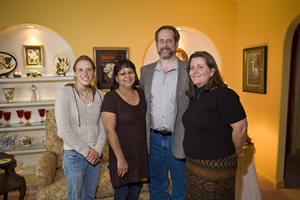Doyle scholarship continues fisheries legacy
Doyle scholarship continues fisheries legacy
Submitted by Carin Bailey
Phone: 907-322-8730
10/29/07

Download photo
Throughout his life, John Doyle worked hard to make the world a better place. After his death last year, his commitment to improving fisheries education continues in the form of a yearly scholarship to women pursuing careers in science.
Doyle, a fisheries expert who made seminal improvements to Alaska’s fishing industry, endowed the scholarship in 2005 after his wife, Kathryn, died. When Doyle passed away in 2006, his family added his name to the scholarship, making it the Kathryn ’K.’ E. and John P. Doyle Scholarship.
"Their goal in life was always continuing education, no matter what your age," said Douglas Doyle, John and Kathryn Doyle’s son. "They would be pleased at what this gift is doing for women at UAF." Douglas adds that his father was continually concerned with how he could work to "make things better."
This year, the endowment awarded its first scholarships to two students at the UAF School of Fisheries and Ocean Sciences: Christine Peterson, an undergraduate fisheries student, and Kelly Newman, a doctoral student in marine biology. The students recently met with the Doyle family at a reception in Fairbanks.
Peterson is a senior in the UAF fisheries program. She is particularly interested in studying salmon and plans to pursue a career in fisheries management. Last year, she completed a semester abroad studying fisheries in Australia, where she joined a diving club and learned about aquaculture and wild fisheries stocks. Peterson will begin her master’s degree in fisheries at UAF next fall.
Newman is studying the feeding behavior and the sounds made by killer whales in the Pribilof Island region. Newman uses a hydrophone, an underwater listening device, to record killer whale noises as they kill and eat their prey. She is particularly interested in finding out whether killer whales in the area are eating northern fur seals. After Newman finishes her Ph.D., she plans on continuing her research and possibly teaching.
Douglas Doyle said his stepmother, Kathryn, would be proud of this year’s scholarship recipients. She flew airplanes loaded with supplies to and from Russia during World War II and took courses at UAF until the end of her life, he said. "She was a woman ahead of her time. She was just always interested in learning."
John Doyle was instrumental in establishing the Marine Advisory Program, the marine extension arm of SFOS with advisory agents in twelve coastal communities across Alaska. Doyle served as the leader of the Marine Advisory Program from the mid-1960s until 1987. He continued his work at UAF as a professor until 1996 and became a professor emeritus in 2003. He also helped establish the UAF Fishery Industrial Technology Center in Kodiak, Alaska.
Doyle’s son, Douglas, said his father had a lifelong commitment to improving Alaska’s seafood products.
"I would shop with him, and he would point at a fillet and say, ’see that mark on that fish-- that is because somebody grabbed it by the tail,’" he said. "He always wanted to make a better product for consumers."
Many of Doyle’s former students are professors now who are teaching their own students, said Michael Castellini, associate dean of the School of Fisheries and Ocean Sciences. Doyle started a "cycle of generosity" that is being handed down through generations, Castellini said. "John’s legacy makes us who we are today."
The Kathryn ’K.’ E. and John P. Doyle Scholarship is available every year to two female students studying science at UAF. For more information about the scholarship, please visit the UAF scholarships website.
About SFOS
The UAF School of Fisheries and Ocean Sciences conducts world-class marine and fisheries research, education and outreach across
Alaska, the Arctic and Antarctic. More than 60 faculty scientists and 160 graduate
and undergraduate students are engaged in building knowledge about Alaska and the
world’s coastal and marine ecosystems. SFOS is headquartered at the University of
Alaska Fairbanks, and serves the state from facilities located in Seward, Juneau,
Anchorage and Kodiak.


